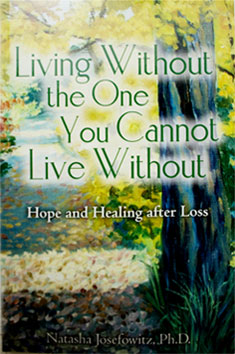Natasha’s words will help anyone who is working through the grief of losing a loved one.”
—Ken Blanchard, New York Times bestselling author
From the first, life-changing terminal diagnosis to a new way of life as a widow, the deeply moving journey of mourning a beloved spouse’s death is the subject of Natasha Josefowitz’s candid, uplifting collection of poems, Living Without the One You Cannot Live Without. Drawing from her own personal experiences navigating the grief of this seemingly unbearable loss, the author’s tender and thoughtful perspective is certain to offer hope and healing to anyone who is embarking on his or her own journey of grief and healing process, regardless of age and life stage.
With rich insight and raw honesty, Living Without the One You Cannot Live Without guides the reader from mourning to recovery, using simple, relatable poetry that casts an unflinching eye on the day-to-day experiences entailed with losing a loved one. The collection starts with a diagnosis of cancer and travels through the moments experienced in doctors’ offices, hospice care, the funeral, and on to the reality of a life alone. Examining the grief process chronologically, the poems progress from the painful early days to the second year, when healing has occurred. The book then culminates with a strong message of hope, as the grieving person emerges once again as a self-sufficient, confident person who is facing the next adventure life has to offer.
Natasha Josefowitz was inspired to put her poems on paper by her own experience with the death of her husband, as well as the grief she witnessed among so many of her friends. She now endeavors to help others who are confronting the unimaginable end of a central relationship. With compassion, clarity, and profound humanity, Living Without the One You Cannot Live Without is certain to offer solace and support to those who are bereft, and who will benefit from empathy and emotional connection as they work through their own grief toward help and healing.
Lost in the Periphery
After my husband died
I was no longer
the center of anyone’slife
nor is anyone
the center of mine
family and friends
are supportive and comforting
but they are peripheral
as I am peripheral
in their lives
they can continue
without me
as I am supposed
to continue
without him
without the one person
I cannot live without



